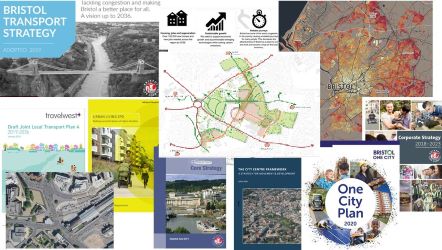
The importance of delivering high quality and sustainable development is incumbent upon the development industry and Bristol City Council is working in partnership to achieve this. The Transport Development Management Guide (TDMG) sets out how the Transport Development Management function works within the planning process to achieve these goals.
Bristol City Council has an environmental and legal commitment to deliver a healthy city for its inhabitants in addition to a statutory obligation to ensure that the transport network is accessible, well maintained and safe. The following considerations have influenced our policymaking in recent years and will continue to be our key strategic aims for the foreseeable future:
- delivering cleaner air
- improving physical and mental health
- reducing social exclusion and transport inequality
- prioritising walking and cycling
- successful placemaking
As our corporate aims are to achieve sustainable growth in a manner that enhances rather than worsens our environment, transport, movement and connectivity must therefore be central to planning decisions.
We have invested significant resource and funding into delivering transport improvements across Bristol and the wider city region to better accommodate existing and future housing and employment growth, in collaboration with our City Design team and neighbouring councils and public transport providers. This has resulted in the following projects which are either delivered, or are in development:
- MetroWest Go to https://travelwest.info/projects/metrowest (opens new window) rail packages 1 and 2, including:
- new stations at Portway, Portishead, Pill, Ashley Down, Filton and Henbury
- MetroBus routes M1, M2 and M3, including:
- South Bristol link road;
- City Centre remodelling, and
- Bus-only routes at Ashton and adjacent to the M32
- Temple Circus remodelling
- Muller Road public transport priority and improved connections to Lockleaze
- Bedminster Green bus, walking and cycling improvements
- A37 and A4018 improvements to walking, cycling and public transport infrastructure
- pedestrianisation of the Old City and closure of Bristol Bridge to general traffic
- Liveable Neighbourhoods
- Local Walking and Cycling Infrastructure Programme (LCWIP) Go to https://www.westofengland-ca.gov.uk/what-we-do/transport/local-cycling-and-walking-infrastructure-plan/ (opens new window)
- Mass transit studies and future MetroBus options assessment
We have delivered a lot, but there is still much more to be done. The city is experiencing a chronic shortage in housing, particularly for the most vulnerable people. Over the coming years, our remit is to deliver new and affordable housing for the existing population where many are currently unable to rent or buy their own home. Added to these pressures is the need to provide employment, education and training for a growing population.
For growth to be delivered successfully, and to avoid the negative outcomes that have been the legacy of previous poorly-located and poorly-served patterns of growth, we must ensure that new development is sustainable, which means minimising the impact on existing and future generations.
Transport Development Management expects all new development to be suitably located and have access to the best walking, cycling and public transport facilities. In doing so, we can work in partnership with developers to minimise the negative health effects of continued reliance on private car travel and other travel behaviours that harm our environment and our people.
In preparing the TDMG, regard is held towards the Brundtland Commission Go to https://sustainabledevelopment.un.org/content/documents/5987our-common-future.pdf (opens new window) report, entitled: Our Common Future, which in 1987 defined the description of sustainable development as “meeting the needs of the present without compromising the ability of future generations to meet their own needs.” Similarly, it has been necessary to take into account the World Health Organisation's requirement for Health in all Policies Go to https://www.who.int/publications/i/item/9789241506908 (opens new window), focussing on achieving success for all partners in tackling specific issues, such as transport and housing, by targeting key policy areas that have significant health impacts.
Where we feel new development proposals will not meet these objectives or fail to exploit or maximise healthy patterns of movement, we will challenge or reject such planning proposals.
